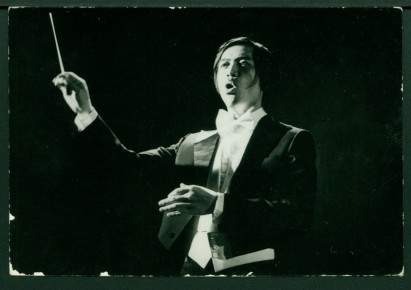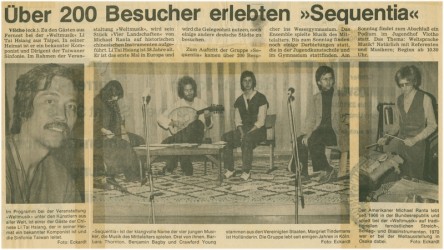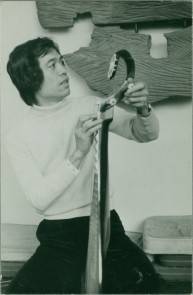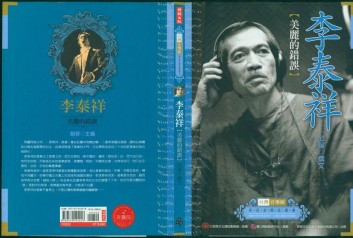|
Tai-Hsiang Li was born on Feb. 20, 1941 to an aboriginal family at Malan Township, Taitung County, Taiwan. His father is Kuang-Hsiung Li and his mother is Lien-Luan Li, a native of Puli Township, Nantou County. The family moved to Taipei in 1946.
After graduating from Department of Music, National Taiwan Academy of Arts in 1961, Li was hired to serve as the first chair violinist of Taipei Symphony Orchestra. At the invitation of Germany’s Goethe Institute in the autumn of 1972, Li and others, including German Professor Wolfram König, formed a quartet. They toured big cities in Taiwan and Southeast Asia, winning favorable reviews.

|
|
|

|
| Graduation photo of Tai-Hsiang Li (1961) |
|
|
Conducting at Taiwan Provincial Symphony Orchestra (1974) |
In the spring of 1971, Li tried out an experimental multi-media performance in Taipei. It was an epochal presentation with deep historical significance and, as a result, Li was awarded full Rockefeller scholarship in spring 1973. At the invitation of U.S. Department of State, he went to major U.S. music schools and orchestras to visit, observe, and engage in advanced studies. After coming back to Taiwan in winter 1974, Li was appointed to the post of Conductor of Taiwan Provincial Symphony Orchestra and National Taiwan University Orchestra, and devoted himself to creating music at his leisure time.
In 1975, Li published his orchestral work “Phenomenon” and conducted Taiwan Provincial Symphony Orchestra to debut this work. In 1976, he published the tape music of “Rain, Zen, Hsimenting.” There was also the cantata “The Sacrifice to God,” which was rearranged later to become the dance dramas of “Wu Feng” and “Shoot the Sun” by Cloud Gate Dance Theatre. In spring 1977, he published “Pure Serene Music” in Tokyo and “Song of the Earth” in Taipei. In the autumn of the same year, he was invited to participate and perform in the program of the third Asian New Media, Japan.
In spring 1978, Li held the first “Visions Springing Up from the Tradition” concert and performed masterpieces such as “Surreal Chant.” In 1979, he produced “Three Chapters of Fantasy” at the Vlotho Festival in Germany. In 1980, his music in the movie “To You with Love” received the Panama Film Festival Award for Best Original Song. In spring 1982, he held the fourth “Visions Springing Up from the Tradition” concert and performed “Feast of Beauty.” In spring 1983, he held the fifth “Visions Springing Up from the Tradition” concert and performed “New Tune” – performing campus folk songs in the form of orchestral chamber music.

|
|
|

|
| Newspaper clipping of Li at Vlotho Festival in Germany (October 13, 1979) |
|
|
Composing art song “The Mistake” (1984) |
In the spring of 1984, Li finished composing dance dramas for Cloud Gate Dance Theatre — four pieces of piano and percussion music for “Three Chapters of Ordinary People” and orchestral music for “Legacy”. In the same year, the military commissioned him to compose a small-scale opera “Legend of Zhang Qian.” It was very popular and performed more than a dozen times, setting up a good example for the military. In autumn 1985, Li adapted the work to make a large-scale opera “Strong Wind Blows Up,” but it’s regrettable that this work has not yet been published and performed.
On November 30, 1986, Li was commissioned by the Council for Cultural Affairs, Taiwan to compose the piano quintet “Three Styles--Breath, Break, Flow.” The work made its debut in the “Contemporary Chinese Composers’ Joint Exhibition,” manifesting Li’s talents and unique style and garnering high marks. Again in spring 1994, the piano quintet “Breath, Break, Flow” was successfully performed in Toronto, Canada. In the spring of 1987, Li published the large-scale musical “The King of Chess.” In 1993, the chamber music “Mountain, String, Reed Pipe Wind Instrument,” which used Mandarin, Taiwanese, and aboriginal languages for female voice, percussion music, piano, and string quartet, made its debut in National Concert Hall, Taipei.

|
|
|

|
| Playing pipa, a four-stringed Chinese musical instrument (1990) |
|
|
Tai-Hsiang Li (1999) |

|
|
|

|
| Interviewed by “Dirty Living,” an American music magazine (April 20, 2002) |
|
|
A recipient of the 12th National Literature and Art Achievement Award (September 26, 2008; photo by Chen-Hsiang Liu) |
For the first half of his life, Tai-Hsiang Li paid much attention to music popularization in addition to composing rigorous classical music works. He thinks that art should be out of the ivory tower, and there could exist a new opening between art and popular music. Therefore, for many singers, he composed a large number of popular art songs such as “The Olive Tree,” “Farewell,” “A Spring Sculpture,” “The Answer,” “The Mistake,” “Chrysanthemum Sigh,” “Journey,” “You Are All My Memories,” “The Sunshine Road,” “Bottle of Sighs,” and “Since You Ask.” These songs were all the rage at the time and widespread for a long while. It’s mainly because his songs not only combined the exquisiteness of academies, but also touched, explored, and ingeniously blend various viewpoints of diverse cultures.
Suffering from Parkinson’s disease since 1988, with trembling hands and difficulty in movement, Li stubbornly fought the illness for many years and underwent deep brain stimulation in 2000 which implanted a pulse generator in his brain. After the surgery, Li finished the trio chamber music work of vocal, piano, and stringed music “Since I Met You That Time,” along with a series of folk songs and art songs. In addition to being public-spirited, Li spares no efforts to promote native Taiwanese and aboriginal music and culture. In recent years, he has been working hard to compose aboriginal songs. In 2002, he adopted the epic “Mountain Jilaya,” written by Lai-Wang Lee, to compose oratorio of the aboriginal Amis epic. From 2004 to 2005, he accepted a commission to compose for the native land and completed the vocal and orchestral music work of Hakka ballad, “Hakka Folk Song—Mountain and Farmland.” Additionally, Li composed the work “Frightened to See Nihong Barrier” for puppet show, modern dance, vocal music, gongs and drums, suona horn, and stringed music. He also composed large-scale orchestral music works for Taiwan ballads such as “Cloudy Sky” and “Clinking Coins.” In 2005, based on Amis epic, Li created the vocal, percussion, and large-scale orchestral music work “Hunting,” and in 2008, he completed violin solo “Malan Suite.”
Text and images are provided by The Native Musician of Taiwan-Tai-Hsiang Li Digital Archive, National Chiao Tung University, Taiwan
|






















